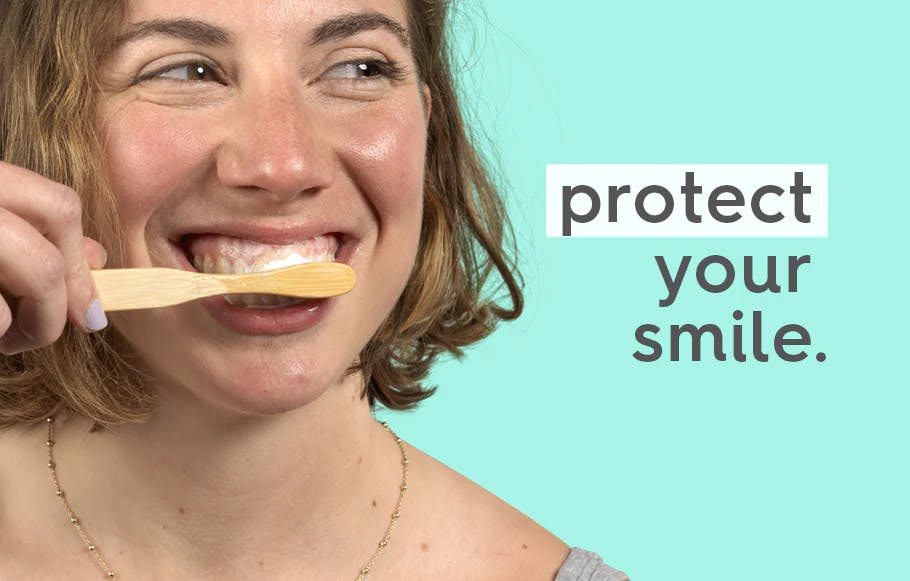15 Sept 2023
Hands up if you thought fluoride was a man-made ingredient? If you did… you’re not alone.
However, fluoride is in fact a naturally occurring mineral that can help protect our teeth against tooth decay. In fact it’s so effective at protecting our teeth against cavities that many local UK authorities have been adding small amounts of it to our water supply since the 1960s.
stop the rot.
According to a 2022 report from the Office for Health Improvement and Disparities (OHID) and the UK Health Security Agency (UKHSA); children in areas with higher fluoride concentrations in the water were up to 63% less likely to require tooth extractions due to decay than those in areas with low fluoride concentrations.
At the moment, individual local authorities decide whether or not to fluoridate the water but your local water supplier should be able to tell you how much fluoride is in your water supply and whether any is added. Most water companies in fact have an online checker where you can use your postcode to find out about the water in your area.

so why do we need fluoride in our toothpaste?
There are so many surprising things going on in our mouths!
For example - demineralisation!
We’ve all heard of plaque… a sticky substance that builds up on our teeth - it’s a mix of leftover food and saliva. Bacteria in our mouth will feed on this plaque. And as they feed, they produce acids that weaken and dissolve our tooth enamel. This is called demineralisation.
Thankfully, fluoride helps control and protect against this damage. When fluoride makes contact with your enamel, it combines with the phosphate and calcium in your teeth to form a substance called fluorapatite. And THAT substance actually remineralises your teeth, reversing small cavities and dental decay.
Added to this… fluoride also has antibacterial properties that can stop the growth of bacteria and prevent them from sticking to our teeth in the first place.
Fluoride really is so effective at repairing the enamel in this way that any other ingredients included by toothpaste manufacturers that also claim to remineralise teeth have only ever been shown to give a tiny 2% improvement over normal fluoride toothpaste. It really is just the fluoride that is doing the lion’s share!
No wonder most dentists recommend using a fluoride toothpaste.
but what if my teeth are sensitive?
There are 3 layers to a tooth. The innermost is the pulp chamber. This is surrounded by a layer called dentin and finally the outer layer is your white enamel layer.
If you have sensitive teeth it is probably because the middle dentin layer of your teeth has become exposed by the erosion of your enamel.
This middle layer is threaded with tubules which allow essential nutrients and fluids to move from the inner pulp chamber out into your dentin layer. If this flow stops or reverses and goes from the dentin layer to the inner chamber… bacteria can get inside your teeth, hot or cold sensations can transmit inwards, sticky or acidic foods can stimulate the nerves. You’re going to feel it all as sensitivity.
Fluoride will remineralise your enamel and strengthen it however, if the enamel has completely eroded it cannot rebuild it again. This is why It's essential to follow proper daily care by brushing twice a day and cleaning between your teeth to protect your dentin tubules and reduce your hypersensitivity risk. Protecting your tubules is important because they don't regenerate.

types of fluoride toothpaste.
To get the most from your fluoride use, a toothpaste needs a concentration of at least 1,000 parts per million (ppm). Most brands use between 1,350 ppm and 1,450 ppm. smol toothpaste is at the higher end of 1450 ppm.
You can find toothpaste with higher concentrations of fluoride (up to 5,000 ppm) but these are really only for use in adults with extensive tooth damage or medical conditions that put them at high risk of cavities.
Children's toothpaste is formulated for children under the age of seven and has a fluoride concentration of 1,000 ppm. Anything below 1,000 ppm is no longer recommended. Our toothpaste has a ppm of 1500 and that’s why we only recommend it for children aged 7 and older.
Finally of course there are non-fluoride toothpastes. These can still keep your breath fresh but they are far less likely to prevent enamel erosion, gum disease, or the buildup of tartar.
reasons to smile.
So if you’re looking for cavity protection, enamel remineralisation and plaque control then you’ll want a fluoride toothpaste.
Anything else you can do to protect your enamel?
- Brush your teeth at least twice a day to remove plaque, tartar and bacteria from your teeth.
- Floss once a day. Plaque, debris and bacteria like to hide in the crevices of your teeth.
- Use a soft-bristled toothbrush such as our brilliantly sustainable bamboo toothbrush. Medium or hard-bristled brushes are too abrasive and can scrub your enamel off.
- Drink fruit juices or fizzy drinks through a straw. This helps prevent prolonged contact between their acids and your teeth.
- Stay hydrated. Drinking water helps wash away plaque, bacteria and food particles.
- If you grind your teeth in your sleep, wear a mouthguard.
- Visit your dentist regularly.
